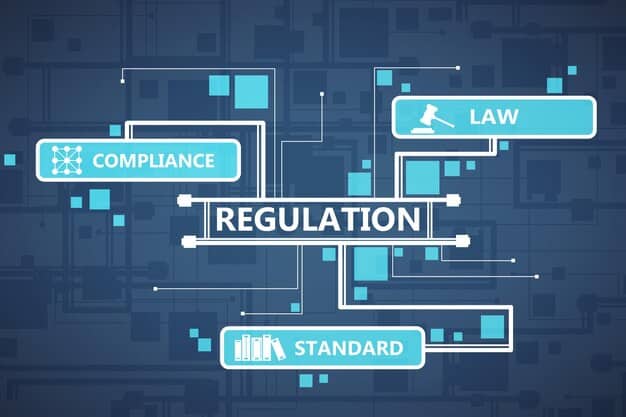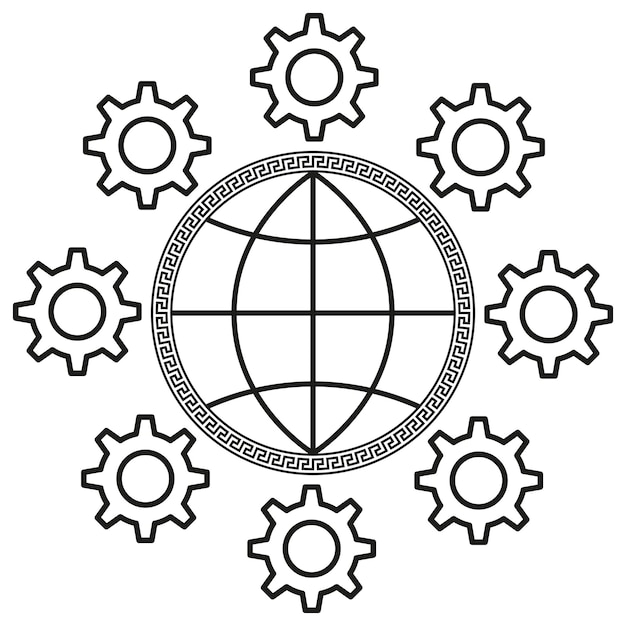Defense Industry Ethics: Key Integrity in Government Contracting

Maintaining integrity in government contracting within the defense industry is paramount, demanding rigorous ethical considerations to ensure transparency, accountability, and the responsible allocation of taxpayer funds, addressing potential conflicts of interest and fostering a culture of compliance.
In the complex world of military procurement, understanding Defense Industry Ethics: What are the Key Considerations for Maintaining Integrity in Government Contracting? is not merely a matter of compliance, but a foundational pillar for national security and public trust. This article delves into the ethical labyrinth of defense contracting, exploring the critical elements that ensure fair play, accountability, and ultimately, a more secure future.
The Foundational Pillars of Ethical Defense Contracting
The defense industry operates on a monumental scale, involving vast sums of taxpayer money and technologies with profound implications for global security. Consequently, the ethical standards governing its interactions with government contracting entities must be exceptionally robust. These standards aren’t abstract ideals; they are practical imperatives that directly influence the effectiveness of defense capabilities and the public’s confidence in governmental stewardship.
One of the primary considerations is the principle of fairness and open competition. Government contracts should ideally be awarded based on merit, technical superiority, and cost-effectiveness, rather than undue influence or cronyism. Establishing clear, transparent bidding processes and ensuring equal opportunities for all qualified bidders are fundamental to preventing corruption and fostering innovation. When this principle is compromised, it can lead to higher costs for taxpayers, inferior equipment for service members, and a general erosion of trust in the system. Beyond formal regulations, a strong ethical culture within contracting firms themselves is vital. This culture should promote honesty, integrity, and a commitment to delivering exactly what is promised, without cutting corners or exploiting loopholes.
Transparency and Accountability Mechanisms
Enhanced transparency acts as a powerful deterrent to unethical practices. When processes are open to scrutiny, it becomes significantly harder for illicit activities to thrive.
* Publicly Available Data: Making contract awards, bid specifications, and performance metrics accessible to the public and oversight bodies.
* Independent Audits: Regular, independent audits of defense contracts to verify financial integrity and compliance with agreed-upon terms.
* Whistleblower Protections: Robust protections for individuals who report suspected wrongdoing, encouraging internal accountability without fear of reprisal.
Conflict of Interest Management
Conflicts of interest pose a significant threat to integrity. These arise when an individual or entity has competing professional or personal interests that could influence their judgment or actions in a defense contract.
* Recusal Policies: Strict policies requiring individuals to recuse themselves from decisions where a conflict of interest exists.
* Disclosure Requirements: Mandatory disclosure of financial holdings, family relationships, and past employment that could create a conflict.
* Post-Employment Restrictions: Regulations preventing former government officials from immediately lobbying or working for defense contractors whom they previously oversaw.
The ethical framework extends beyond simply avoiding malfeasance; it also encompasses a proactive commitment to responsible business practices. This includes adherence to environmental regulations, fair labor practices, and the ethical sourcing of materials. Ultimately, the goal is to build a contracting environment where ethical conduct is not just enforced, but deeply ingrained in every decision and transaction.
Navigating the Complexities of Compliance and Regulatory Frameworks
The defense industry operates within a dense web of regulations designed to ensure integrity and prevent abuse in government contracting. Understanding and rigorously adhering to these frameworks are absolutely essential for any entity involved in this sector. These regulations are not static; they evolve in response to technological advancements, geopolitical shifts, and lessons learned from past compliance failures. Key among these are the Federal Acquisition Regulation (FAR), Defense Federal Acquisition Regulation Supplement (DFARS), and various statutes related to anti-corruption, fraud, and national security.
Compliance fatigue can be a real challenge for contractors, given the sheer volume and complexity of the rules. However, overlooking any aspect can lead to severe penalties, including substantial fines, contract termination, debarment from future contracts, and even criminal charges. Proactive compliance programs are therefore not just a legal necessity but a strategic imperative. These programs typically involve extensive training for employees at all levels, internal audits, and robust reporting mechanisms to identify and address potential issues before they escalate.
Key Regulatory Bodies and Their Roles
Several government entities play critical roles in overseeing defense contracting, ensuring adherence to ethical standards and legal requirements.
* Department of Defense (DoD): Sets acquisition policies and oversees contracting activities across its various branches.
* Defense Contract Audit Agency (DCAA): Provides auditing services for DoD contracts, ensuring fair and reasonable pricing.
* Department of Justice (DOJ): Investigates and prosecutes cases of fraud, conflicts of interest, and other illegal activities in government contracting.
Anti-Corruption and Bribery Measures
Given the global nature of defense procurement, anti-corruption measures are particularly stringent. Laws like the Foreign Corrupt Practices Act (FCPA) prohibit U.S. companies and individuals from bribing foreign officials to obtain or retain business.
* Due Diligence on Third Parties: Thorough vetting of agents, consultants, and joint venture partners working internationally to ensure they adhere to anti-bribery standards.
* Clear Gift and Entertainment Policies: Strict guidelines on providing gifts and entertainment to government officials, both domestic and foreign.
* Internal Controls: Implementing robust financial controls to prevent unauthorized payments and detect suspicious transactions.
Furthermore, maintaining integrity involves a continuous process of education and adaptation. As technologies emerge and threats evolve, so too do the risks associated with contracting. Companies must invest in ongoing training for their workforce, ensuring that employees understand not only the letter of the law but also the spirit of ethical conduct. This proactive approach to compliance helps build a culture of integrity that permeates throughout the organization, extending beyond mere legal obligation to a shared commitment to ethical behavior.
Ensuring Data Security and Intellectual Property Protection
In the modern defense landscape, the integrity of government contracting extends far beyond financial probity to encompass the vital areas of data security and intellectual property (IP) protection. Defense contracts often involve highly sensitive information, including classified data, proprietary technologies, and strategic plans, all of which are attractive targets for cyber espionage and theft. Protecting this information is not just a matter of corporate responsibility; it is a critical national security imperative. Breaches can compromise military readiness, reveal strategic weaknesses, and undermine technological advantages.
Companies engaged in defense contracting must implement stringent cybersecurity measures that meet or exceed government requirements. This includes robust encryption, secure networks, access controls, and regular vulnerability assessments. The flow of information must be meticulously managed throughout the contract lifecycle, from bid submission to project completion and beyond. Furthermore, the protection of intellectual property, whether developed by the government or by contractors, is crucial for fostering innovation and ensuring that the United States maintains its technological edge. Clear agreements on data rights and intellectual property ownership are essential to prevent disputes and unauthorized use.
Cybersecurity Protocols and Best Practices
Adopting a defense-in-depth approach to cybersecurity is paramount for any contractor.
* NIST Compliance: Adherence to standards set by the National Institute of Standards and Technology (NIST), particularly NIST SP 800-171 and CMMC (Cybersecurity Maturity Model Certification).
* Employee Training: Regular training emphasizing awareness of phishing, social engineering, and other common cyber threats.
* Incident Response Planning: Developing and regularly testing comprehensive plans for detecting, responding to, and recovering from cyber incidents.
Intellectual Property Rights and Safeguards
The treatment of intellectual property is a complex but critical aspect of defense contracting, requiring clear definitions and strong protections.
* Data Rights Clauses: Negotiating and understanding specific clauses in contracts that define ownership and usage rights for technical data and computer software.
* Export Controls: Strict adherence to export control regulations (e.g., ITAR, EAR) to prevent the unauthorized transfer of sensitive technology to foreign entities.
* Trade Secret Protection: Implementing internal measures to safeguard proprietary designs, processes, and knowledge that constitute trade secrets.
Effectively managing data security and intellectual property also involves robust supply chain security. Contractors must ensure that their subcontractors and suppliers also adhere to appropriate security standards, as a weakness anywhere in the chain can expose sensitive information. This requires thorough vetting and continuous monitoring of third-party vendors. Ultimately, integrity in this domain means not only protecting what already exists but also ensuring that the systems developed today can withstand the threats of tomorrow, safeguarding the nation’s technological and strategic advantage.
The Role of Corporate Culture and Leadership in Fostering Integrity
While regulations and compliance frameworks provide the external structure for ethical conduct, the internal engine that drives integrity in defense contracting is robust corporate culture and strong ethical leadership. A company’s values, communicated from the top down and embodied by its leadership, profoundly influence employee behavior. When integrity is genuinely prioritized, it becomes woven into the fabric of daily operations, guiding decisions from the smallest administrative task to the largest strategic initiative. Conversely, a culture that tolerates or encourages shortcuts, even if not explicitly illegal, can quickly erode ethical standards, leading to compliance failures and reputational damage.
Effective ethical leadership involves more than just issuing policy statements; it requires consistent modeling of desired behavior, transparent communication about ethical expectations, and a willingness to hold all employees, including senior management, accountable for their actions. It means fostering an environment where employees feel safe to raise concerns without fear of retaliation and where ethical dilemmas are discussed openly and resolved constructively. This kind of leadership creates a “speak-up” culture, essential for early detection of potential issues and for preventing serious breaches.
Cultivating an Ethical Environment
Building an ethical culture requires consistent effort and a multi-faceted approach.
* Clear Code of Conduct: A comprehensive and easily understandable code of conduct that articulates the company’s ethical principles and expectations for all employees.
* Ethics Training: Regular and engaging training programs that go beyond legal requirements, focusing on real-world dilemmas and decision-making processes.
* Open Communication Channels: Establishing multiple avenues for employees to report ethical concerns, such as anonymous hotlines or dedicated ethics officers.
Leadership and Accountability
Leadership’s commitment to ethics is the single most important factor in shaping corporate culture.
* Tone at the Top: Senior executives consistently demonstrating their commitment to ethical conduct through their words and actions.
* Fair Enforcement: Applying disciplinary measures fairly and consistently across all levels of the organization when ethical guidelines are violated.
* Rewarding Ethical Behavior: Recognizing and rewarding employees who demonstrate strong ethical conduct, reinforcing positive behaviors.
Ultimately, the goal is to move beyond mere compliance to a state of embedded integrity, where ethical considerations are an intrinsic part of every business decision, rather than an afterthought or a burden. This not only mitigates risks but also enhances a company’s reputation, strengthens its relationships with government clients, and contributes to the overall health and effectiveness of the defense ecosystem. Employees who work in an ethical environment are also typically more engaged and productive, further benefiting the organization.
Ethical Challenges in Supply Chain Management
The defense industry’s reliance on complex, global supply chains introduces a unique set of ethical challenges that demand careful consideration. A finished defense product, whether it’s an advanced fighter jet or a sophisticated communication system, is often the culmination of components and services sourced from dozens, or even hundreds, of different suppliers across multiple countries. Ensuring integrity throughout this intricate web is a monumental task. Ethical failures at any point in the supply chain – from the extraction of raw materials to the manufacturing of subcomponents – can have far-reaching consequences, impacting product quality, national security, and a company’s reputation.
Key ethical concerns in the supply chain include the sourcing of materials (e.g., conflict minerals), labor practices (e.g., forced labor, child labor), environmental compliance, and the anti-bribery measures discussed earlier. A contractor is often held responsible not only for its own actions but also for ensuring that its suppliers adhere to similar ethical standards. This necessitates robust due diligence processes, ongoing monitoring, and the establishment of clear contractual requirements for ethical conduct throughout the entire supply chain.
Managing Subcontractor Relationships
Subcontractors are integral to defense procurement, and managing their ethical behavior is critical.
* Vetting and Due Diligence: Thorough background checks and risk assessments of potential subcontractors, including their ethical compliance history.
* Contractual Flow-Down Provisions: Ensuring that ethical and compliance requirements stipulated in prime contracts are flowed down and enforced with subcontractors.
* Performance Monitoring: Regularly assessing subcontractor performance, not just on technical and cost metrics, but also on adherence to ethical standards.
Addressing Sourcing and Labor Issues
Responsible sourcing is a growing ethical imperative, especially in global supply chains.
* Conflict Minerals Policies: Implementing policies and due diligence processes to ensure that minerals like tin, tantalum, tungsten, and gold are not sourced from conflict-affected and high-risk areas.
* Human Rights Assessments: Conducting assessments to identify and mitigate risks of forced labor, human trafficking, and unsafe working conditions within the supply chain.
* Environmental Responsibility: Ensuring that suppliers adhere to environmental regulations and sustainable practices in their operations.
The complexity of global supply chains means that a contractor cannot simply assume ethical conduct on the part of its suppliers. Instead, it requires proactive engagement, transparent communication, and, in some cases, the willingness to terminate relationships with suppliers who fail to meet established ethical benchmarks. By focusing on supply chain integrity, defense contractors not only mitigate risks but also contribute to a more responsible and sustainable global economy, reinforcing their commitment to ethical business practices from end to end.
The Importance of Independent Oversight and Whistleblower Protection
Maintaining integrity in government contracting, particularly in the defense industry, necessitates more than just internal controls; it requires robust external oversight and strong protections for whistleblowers. While corporate ethics programs and government audits are crucial, an independent layer of scrutiny is essential to identify and address issues that might otherwise remain unseen or unaddressed. This oversight can come from various sources, including government accountability offices, non-governmental organizations, and especially from individuals within the industry who are willing to expose wrongdoing.
Whistleblowers play a uniquely critical role in uncovering fraud, waste, and abuse in defense contracts. Often, these individuals are the first to identify systemic problems or specific instances of misconduct because they have direct, firsthand knowledge. However, reporting such information can come with significant personal and professional risks. Therefore, strong legal and ethical protections for whistleblowers are not just a matter of fairness but a public interest imperative. Without these protections, fear of retaliation can silence valuable insights, allowing corruption and inefficiency to persist unchecked.
Mechanisms of External Oversight
Various external bodies contribute to the integrity of defense contracting through their independent scrutiny.
* Government Accountability Office (GAO): Provides auditing, evaluation, and investigative services for the U.S. Congress, often examining defense programs and contracts.
* Inspectors General (IGs): Offices within government agencies (like the DoD IG) that conduct independent audits and investigations of programs and operations.
* Congressional Oversight Committees: Committees in Congress that hold hearings and conduct investigations to ensure proper use of taxpayer funds and adherence to regulations.
Safeguarding Whistleblowers
Protecting whistleblowers is critical for encouraging the disclosure of vital information.
* Legal Protections: Laws like the Whistleblower Protection Act and the False Claims Act offer legal recourse for whistleblowers who experience retaliation.
* Anti-Retaliation Policies: Companies and government agencies must have clear policies prohibiting retaliation against employees who report concerns in good faith.
* Anonymous Reporting Channels: Providing secure and anonymous channels for employees to report wrongdoing, ensuring their identity is protected if they choose.
The interplay between robust internal ethics programs and strong external oversight, particularly through the courageous actions of whistleblowers, creates a powerful ecosystem for integrity. It reinforces the message that ethical conduct is not merely aspirational but enforceable, and that accountability will be sought for those who compromise the integrity of defense contracting. This shared responsibility helps to safeguard public funds, ensure the quality of defense assets, and bolster national security by fostering trust and discouraging illicit activities within the sector.
The Future of Ethics in Defense Contracting: Technology and Trends
As the defense industry continues to evolve at a rapid pace, driven by emerging technologies and shifting geopolitical landscapes, the ethical considerations for maintaining integrity in government contracting must also adapt and expand. New technologies, such as artificial intelligence (AI), machine learning (ML), autonomous systems, and advanced cybersecurity tools, introduce novel ethical dilemmas that were unimaginable just a few decades ago. Meanwhile, increased global competition and the push for faster acquisition cycles place additional pressure on ethical frameworks. Future integrity will hinge on proactively addressing these trends and integrating ethical principles into the very design and deployment of new defense capabilities.
The adoption of AI, for instance, raises questions about algorithmic fairness, accountability for autonomous decisions, and the ethical use of data in defense applications. Similarly, the increasing interconnectedness of systems through the Internet of Things (IoT) in defense creates expanded attack surfaces and new challenges for data security and privacy. Beyond technology, there’s a growing emphasis on sustainability, social responsibility, and the ethical sourcing of emerging critical materials. Defense contractors of the future will need to demonstrate not only technical prowess and financial integrity but also a profound commitment to broader societal and environmental ethics, often going beyond current regulatory minimums.
Ethical Implications of Emerging Technologies
New defense technologies present complex ethical quandaries that require careful foresight and policy development.
* AI and Autonomous Systems: Developing ethical guidelines for the use of AI in decision-making processes, weapon systems, and data analysis to ensure accountability and prevent bias.
* Cyber Warfare Ethics: Establishing norms and ethical boundaries for offensive and defensive cyber operations, particularly concerning civilian infrastructure and data privacy.
* Biotechnology and Advanced Materials: Addressing ethical sourcing and use of cutting-edge materials and biotechnologies with dual-use potential.
Evolving Trends in Government Contracting
Broader trends in government procurement will also shape the ethical landscape.
* Faster Acquisition: Balancing the need for rapid deployment of new technologies with thorough ethical review and due diligence processes.
* Increased Data Sharing: Ensuring the ethical and secure exchange of sensitive information across diverse contractors, government agencies, and international partners.
* Sustainability and ESG: Incorporating Environmental, Social, and Governance (ESG) criteria into contract evaluations, promoting responsible business practices.
The future of ethics in defense contracting will require a dynamic and forward-thinking approach. It will involve continuous dialogue among industry leaders, government policymakers, academia, and civil society to define and refine ethical boundaries for an increasingly complex world. Companies that proactively integrate these considerations into their innovation processes and business models will not only be more compliant but also more resilient, trusted, and ultimately, more successful in contributing to national security in an ethically sound manner. This journey demands constant vigilance and a steadfast commitment to the highest standards of integrity.
| Key Area | Brief Description |
|---|---|
| ⚖️ Fair Competition | Ensuring transparent and unbiased bidding processes for all contractors. |
| 🛡️ Data Security & IP | Protecting sensitive information and intellectual property from cyber threats. |
| 🤝 Corporate Culture | Leadership fostering an environment of integrity and ethical behavior. |
| 🗣️ Whistleblower Protection | Safeguarding individuals who report unethical practices and misconduct. |

Frequently Asked Questions About Defense Industry Ethics
Ethics is paramount in defense contracting due to the immense taxpayer funds involved, the critical national security implications of military equipment, and the potential for severe consequences from corruption or sub-standard products. It directly impacts military readiness, public trust, and global stability, demanding the highest standards of integrity to prevent waste, fraud, and abuse.
Common ethical pitfalls include conflicts of interest, bribery, fraud (e.g., inflated costs, misrepresentation of capabilities), revolving door issues where former officials leverage old contacts, intellectual property theft, and the use of unethical labor practices in global supply chains. These can lead to significant legal, financial, and reputational damage for all parties involved.
Government regulations like the Federal Acquisition Regulation (FAR) and Defense Federal Acquisition Regulation Supplement (DFARS) establish strict rules for procurement. They mandate transparency, require fair and open competition, prohibit conflicts of interest, and enforce anti-bribery measures. Independent audits by agencies like DCAA and oversight by the Department of Justice further ensure compliance and deter misconduct.
Corporate culture is foundational. Strong ethical leadership, a clear code of conduct, regular ethics training, and fostering an environment where employees feel safe to report concerns are vital. This cultivates a proactive approach to integrity, moving beyond mere compliance to genuinely embedding ethical decision-making into every aspect of operations across the organization.
Emerging technologies such as AI, autonomous systems, and advanced cyber tools introduce new ethical complexities, including issues of algorithmic bias, accountability for autonomous actions, and enhanced data security and privacy concerns. Ensuring integrity now involves developing ethical guidelines for these technologies and rapidly adapting compliance frameworks to address novel risks.

Conclusion
The discussion around Defense Industry Ethics: What are the Key Considerations for Maintaining Integrity in Government Contracting? reveals a multifaceted challenge that transcends simple legal compliance. It is about fostering a pervasive culture of integrity that values transparency, accountability, and ethical conduct at every level. From rigorous regulatory adherence and robust data security to nurturing an ethical corporate ethos and protecting whistleblowers, each element plays a critical role in safeguarding national security assets and ensuring public trust. As technology advances and global landscapes shift, a dynamic and proactive approach to ethics will remain paramount for the defense industry to continue serving its vital role with unwavering integrity.





